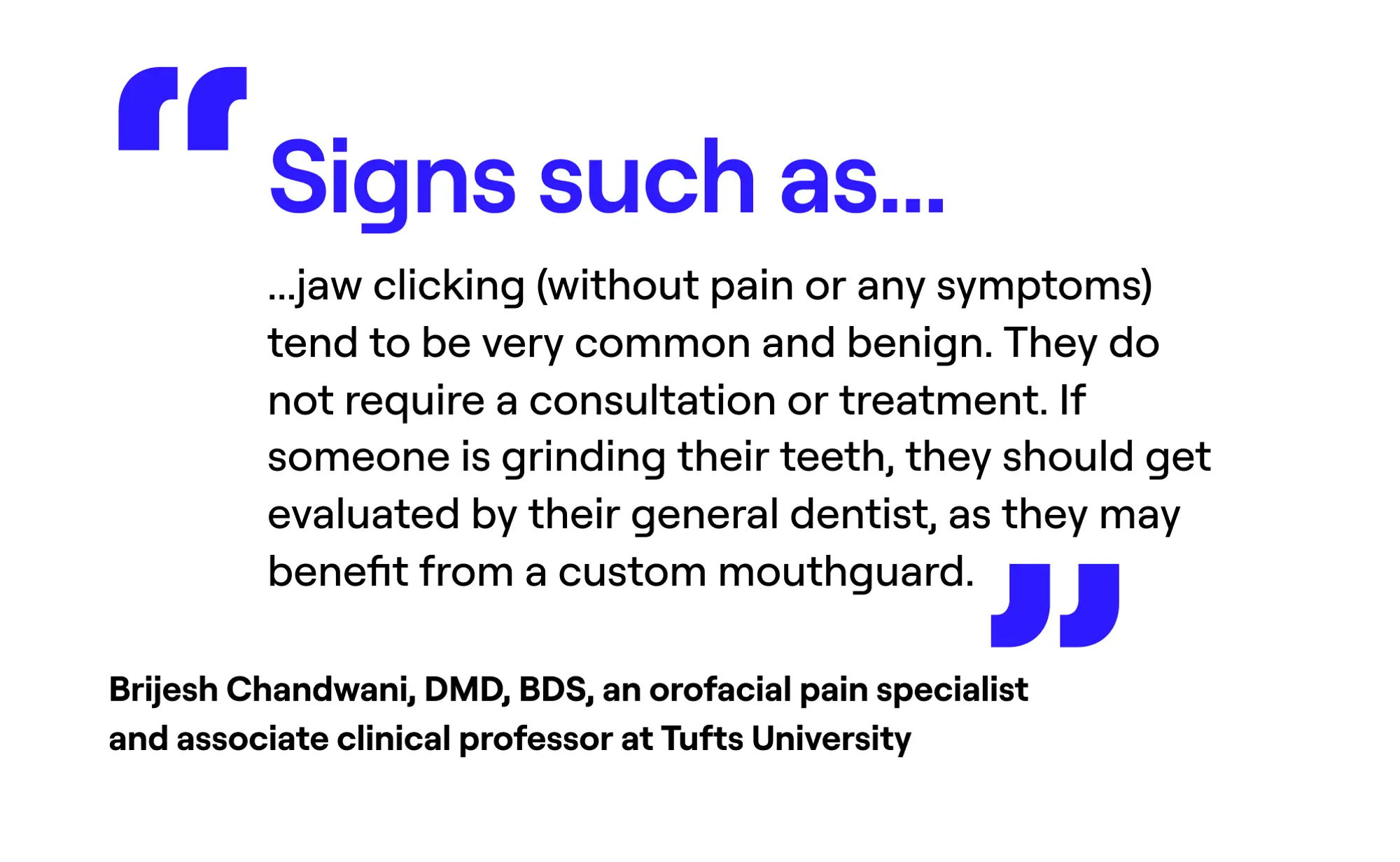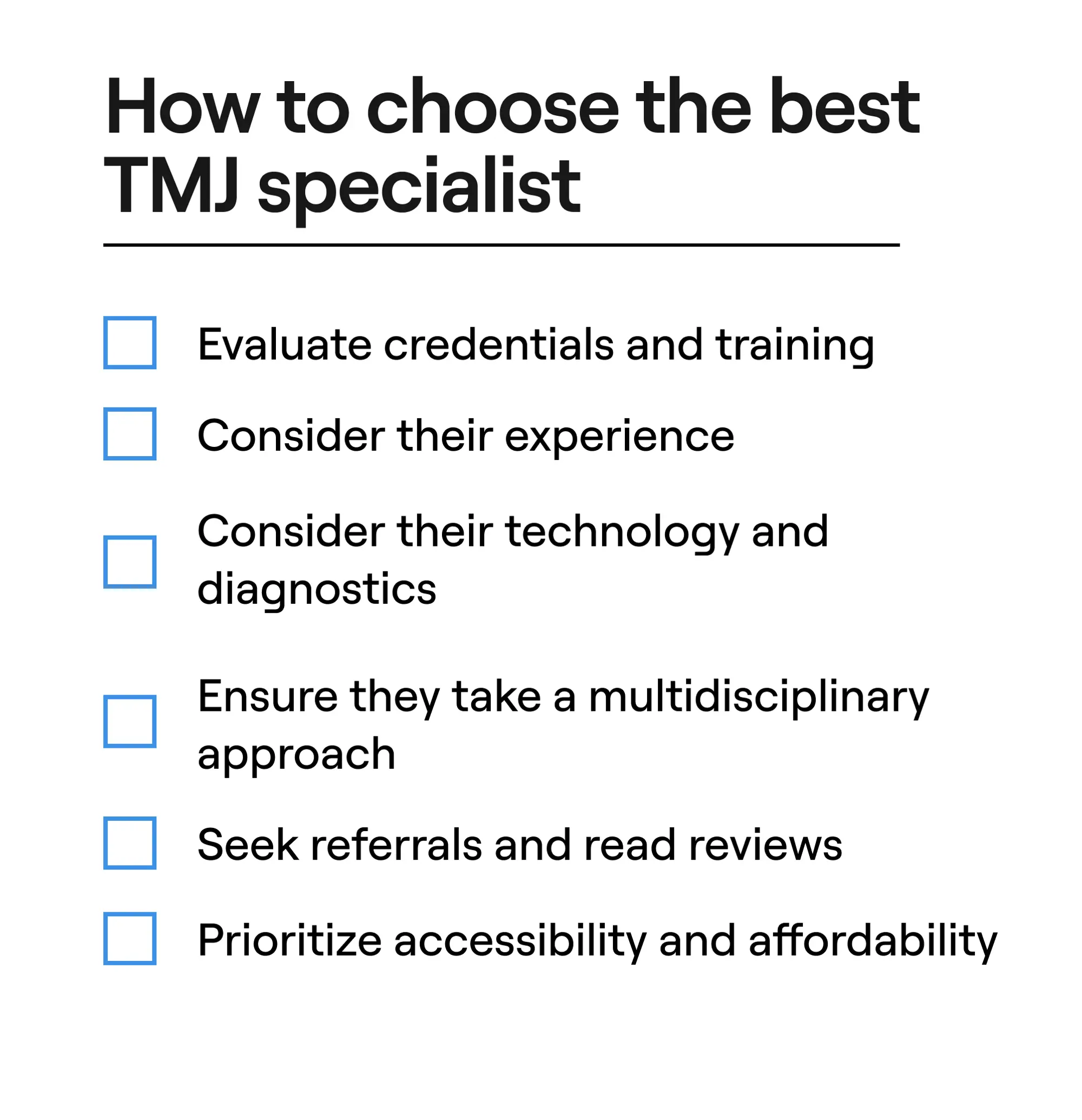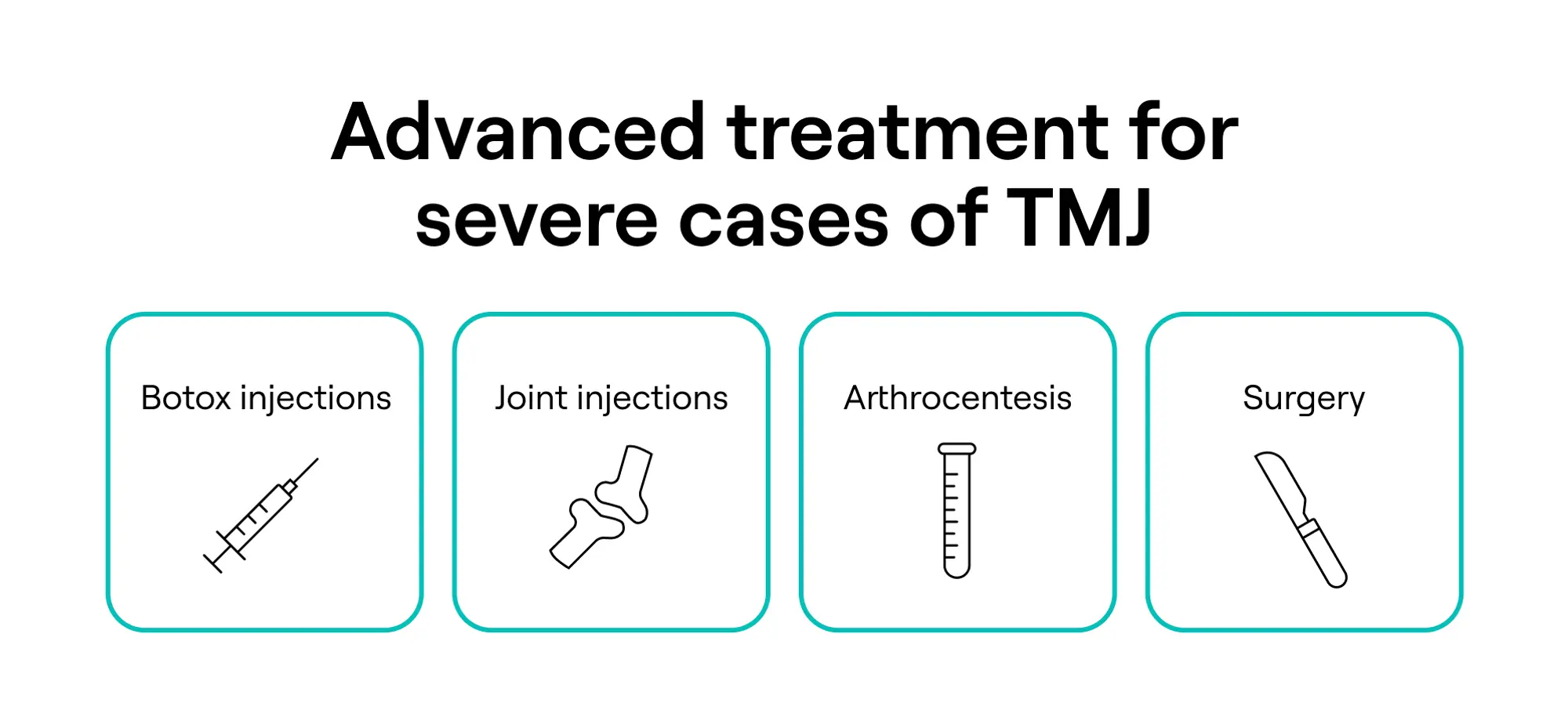Jump to
Book a visit
$25 typical copay
$100 without insurance
Get expert care for your pain today.
If your jaw pops, your ears feel full, or you wake up with headaches and tension, TMJ disorder could be the culprit. The key to lasting relief is finding the right specialist, but with so many options (dentist? ENT? surgeon?), it’s easy to feel lost. This guide breaks it all down: what TMJ is, who treats it, which treatments work, and how to get started.
Jaw pain. Clicking sounds. A weird pressure in your ears. If you're experiencing these symptoms, you may be among the 5-10% of the population who deal with temporomandibular joint (TMJ) disorder. Finding the right TMJ specialist can make all the difference in getting relief, but first, you need to know what you're looking for.
And we’re here to help you do it: This guide will walk you through TMJ disorder, what kind of provider you need, what treatments they offer, and how to connect with the right care so jaw troubles can be a thing of the past.
What is TMJ disorder? (A quick overview)
Your temporomandibular joints connect your jawbone to your skull on both sides of your face. TMJ disorders—sometimes called temporomandibular joint dysfunction (TMD)—occur when these joints or surrounding muscles stop working properly.
Common TMJ symptoms include:
- Jaw pain or tenderness
- Clicking or popping when you open your mouth
- Trouble opening your mouth fully
- Headaches or facial pain
- Ear pain or ringing
- Neck and shoulder tension
Sometimes TMJ issues stem from an injury. At other times, they’re linked to grinding your teeth, misalignment of the teeth, arthritis, or stress.
Who is a TMJ specialist?
According to Sandip Sachar, DDS, a dentist specializing in TMJ in private practice in New York City, while the American Dental Association (ADA) doesn’t recognize TMJ as a standalone specialty, “TMJ specialist” is not an official title. However, as of 2022, the ADA does formally recognize orofacial pain is a recognized dental specialty that includes advanced training in TMJ disorders as part of the scope of practice, explains Brijesh Chandwani, DMD, BDS, an orofacial pain specialist and associate clinical professor at Tufts University.
Overall, the most common types of TMJ providers include:
- Orofacial pain specialists: These providers are uniquely trained to diagnose and manage TMJ disorders and related conditions. “Orofacial pain specialists typically have residency training and are board-certified by the American Board of Orofacial Pain,” says Chandwani. “They have specialized training in dentistry, neurology, sleep medicine, and psychology to best deal with TMJ disorders and orofacial pain.”
- Dentists, prosthodontists, and oral surgeons with advanced TMJ training: Some experts, like Sachar, have postgraduate training in orofacial pain, dental sleep medicine, or TMD, which better equips them to treat TMJ issues.
- Oral and maxillofacial surgeons: These are dental surgeons who specialize in treating conditions involving the jaw and face, and they may handle complex or surgical TMJ cases, says Sachar.
- ENT specialists (otolaryngologists): These physicians may be consulted when TMJ symptoms overlap with ear-related issues, such as ear pressure, ringing, or dizziness, says Sachar.
- Physical therapists: Some physical therapists have specialized training in jaw function and facial pain, and they can provide manual therapy and targeted exercise to improve mobility and reduce muscle tension.
Sachar also emphasizes that because TMJ disorders often overlap with issues like sleep disturbances and stress, effective care typically requires a team approach. “A good TMJ provider should be comfortable working with ENT doctors, sleep physicians, physical therapists, and sometimes behavioral therapists,” he says.
When should you see a TMJ specialist?
Milder cases of TMJ don’t require medical care and may improve on their own with simple lifestyle adjustments, like using hot or cold packs or taking over-the-counter anti-inflammatory medications. Stress reduction techniques, like jaw relaxation exercises or meditation, may also help if clenching or grinding is a contributing factor.
“Signs such as jaw clicking (without pain or any symptoms) tend to be very common and benign,” says Chandwani. “They do not require a consultation or treatment. If someone is grinding their teeth, they should get evaluated by their general dentist, as they may benefit from a custom mouthguard.”

Signs of TMJ
However, if the pain doesn’t go away, gets worse, or starts interfering with everyday activities like eating, speaking, or sleeping, Sachar says it’s time to consult a TMJ specialist. Persistent symptoms could signal an underlying issue that needs professional evaluation and targeted treatment.
Sachar recommends seeing a provider if the following symptoms persist for more than a few weeks or significantly impact your daily life:
- Jaw pain or tenderness
- Clicking, popping, or grinding noises when you open and close your mouth
- Limited ability to open your mouth fully or comfortably
- Locking of the jaw (either open or closed)
- Chronic headaches, earaches, or facial pain with no clear cause
- Difficulty chewing or a noticeable change in your bite
- Neck, shoulder, or upper back pain that seems to radiate from your jaw
How to choose the best TMJ specialist
Finding the right TMJ provider can make all the difference in getting effective, lasting relief. Here are the key steps to help you choose a qualified, trustworthy specialist:
- Evaluate credentials and training: Start by checking the provider’s education and clinical background for advanced training in TMJ disorders, orofacial pain, or dental sleep medicine, says Sachar. Board certification from the American Board of Orofacial Pain is a strong indicator of specialized expertise, adds Chandwani.
- Consider their experience: Ask how often they treat TMJ-related conditions and whether it's a major focus of their practice. “Look for providers with extensive clinical experience treating TMJ disorders and OSA, particularly those who focus on conservative, non-surgical approaches with a proven history of success,” says Sachar. “Be cautious of anyone who immediately recommends surgical procedures or extensive bite reconstruction without first exploring conservative therapies.”
- Consider their technology and diagnostics: Dentists who use advanced tools can typically provide more precise evaluations and better-integrated treatment plans, according to Sachar. In some cases, advanced 3D imaging may aid diagnosis, particularly for complex or surgical TMJ cases. Sleep studies can also be helpful when TMJ symptoms are linked to conditions like obstructive sleep apnea.
- Ensure they take a multidisciplinary approach: “TMJ conditions frequently require a collaborative treatment plan involving appliance therapy with a custom appliance and stress management techniques,” says Sachar. A well-rounded provider should also be open to coordinating care with other specialists—including ENT doctors, sleep physicians, physical therapists, or behavioral health providers—when needed.
- Seek referrals and read reviews: Talk to your general dentist or primary care provider for trusted recommendations. Online reviews and testimonials can also give you the inside scoop on the provider’s approach, bedside manner, and treatment outcomes.
- Prioritize accessibility and affordability: Consider practical factors like location, appointment availability, and whether the provider offers virtual consultations. TMJ treatment can be costly, so it’s important to ask about insurance coverage and out-of-pocket expenses upfront. General Medicine can help streamline this process by providing access to specialists without the need for a referral, along with upfront pricing.

How to choose a TMJ specialist
Common treatments offered by TMJ specialists
TMJ treatment typically begins with non-invasive therapies. These are often highly effective and carry fewer risks than surgical options. Here’s how to fix TMJ with more conservative options:
- Custom oral appliances (nightguards or splints): These devices are worn over the teeth, usually at night, to reduce clenching and grinding, relieve pressure on the jaw, and promote proper alignment, says Sachar.
- Jaw exercises: Targeted stretches and self-massage can help improve joint function and mobility, says Chandwani.
- Lifestyle changes: According to Sachar, eating softer foods, avoiding habits like gum chewing, and practicing jaw relaxation techniques can make a big difference.
- Medications: Your doctor may recommend over-the-counter painkillers or short-term use of prescription medications like muscle relaxants or pain relievers, says Sachar.
- Behavioral therapy: Cognitive behavioral therapy can help address stress-related habits that contribute to TMJ, such as jaw clenching, grinding, or tension, says Sachar.
Severe cases may call for more advanced treatments, such as:
- Botox injections: While Botox is sometimes used off-label to reduce jaw muscle tension, according to Sachar, it’s not FDA-approved for TMJ and should typically be considered only after conservative treatments have failed. Effects typically last three to four months.
- Joint injections: In some cases, a specialist may inject steroids or anesthetics directly into the joint to reduce inflammation and improve mobility, says Chandwani.
- Arthrocentesis: This minimally invasive procedure involves removing fluid from the joint to relieve pressure, says Sachar.
- Surgery: This is a last-resort option reserved for severe, complex cases that don’t respond to other treatments, according to Chandwani.

Advanced treatments for TMJ
Fortunately, “reversible and conservative treatments have proved to be highly effective,” he says. “Surgery is rarely needed.”
Questions to ask your TMJ specialist
Your first conversation with a TMJ provider is a chance to get clear on their approach, experience, and whether they’re the right fit for your needs. It’s also an opportunity to better understand your symptoms and explore the available treatment options.
According to Sachar and Chandwani, here are some smart questions to ask:
- How much of your practice is focused on TMJ disorders?
- What is your training and experience related to TMJ disorders?
- What types of treatments do you offer, and what is their success rate?
- Do you start with conservative care?
- Can you explain the likely cause of my TMJ symptoms in detail?
- Do you work with other specialists if needed?
- What does success look like for treatment?
- What are your thoughts on surgery?
- Do you accept my insurance?
- Are virtual consultations available?
How telehealth can simplify your TMJ treatment
Telehealth can be a convenient and effective first step in managing TMJ symptoms. A virtual consultation allows you to speak with a clinician from the comfort of your home, often with shorter wait times and faster access to care.
During an online appointment, a provider can talk through your symptoms, review your medical history, and help identify whether your pain is TMJ-related. They can also recommend initial treatment strategies, like over-the-counter medications, relaxation techniques, or diet modifications.
Telehealth is a particularly good option for:
- Mild to moderate symptoms that haven’t responded to home care
- Seeking a second opinion or treatment plan review
- Coordinating multidisciplinary care (like an ENT physician or physical therapist)
- Managing follow-ups or medication adjustments
General Medicine offers virtual consultations to help you get quick answers and clear next steps on your jaw pain.
The takeaway
- TMJ disorder affects the jaw joint and muscles, and can cause symptoms like jaw pain, ear pressure, headaches, and facial tension.
- There's no official “TMJ specialist,” but providers with training in orofacial pain, dental sleep medicine, and jaw disorders—such as orofacial pain specialists, dentists, and ENTs—can all help.
- Conservative treatments like mouthguards, over-the-counter pain relievers, physical therapy, and stress management are usually effective and should be tried before more advanced options like injections or surgery.
- When choosing a provider, ask about their experience, training, treatment approach, and whether they collaborate with other specialists.
- Telehealth visits are a convenient way to evaluate your symptoms, explore treatment options, and connect with the right TMJ specialist.
General Medicine follows a strict editorial process, including using real experts to write our articles, vetted primary sources, fact-checking, a secondary medical review, and updates as necessary. This article was medically reviewed and fact checked by Ecler Ercole Jaqua, MD and Swapna Ghanta, MD.
FAQ
What type of doctor is best for TMJ?
Orofacial pain specialists are typically the most specialized. But dentists, prosthodontists, and oral surgeons with training in TMD, along with some ENTs, also know how to treat TMJ.
What is the 3-finger test for TMJ?
The 3-finger test for TMJ is a quick way to check jaw mobility. If you can’t fit three fingers vertically into your open mouth, it may signal restricted movement, which is a possible symptom of TMJ.
What is a TMJ specialist?
“TMJ specialist” is an informal term for providers with advanced training in TMJ care, such as orofacial pain specialists, dentists, or oral surgeons.
Is it worth it to see a TMJ specialist?
If your symptoms persist for weeks or impact daily life, it’s worth seeing a specialist to explore targeted treatment options and help prevent the issue from getting worse.
Does an ENT treat TMJ?
An ENT can help treat TMJ—in particular, if your symptoms involve the ears, like fullness, pain, or ringing. ENTs may work alongside dentists or other TMJ-trained providers as part of a holistic approach to treatment.
Can an orthodontist treat TMJ?
While some orthodontists may offer TMJ support, they’re not usually the first-line provider. Instead, visiting a general dentist or a dentist with training in TMD is a better place to start, says Sachar.
Our editorial standards
At General Medicine, we cut through the clutter to make health care clearer, faster, and easier to navigate. Every article is grounded in evidence-based research and peer-reviewed journals, reviewed by medical professionals, and written in accessible language that helps you make health decisions with confidence. We’re committed to ensuring the quality and trustworthiness of our content and editorial process by providing information that is up-to-date, accurate, and actually useful. For more details on our editorial process, see here.


